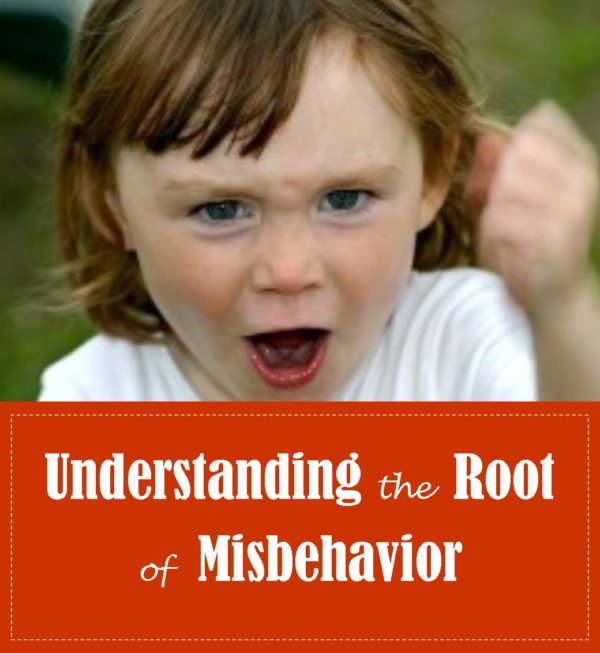
When kids behave badly, it’s easy to focus solely on the behavior we don’t like. We want the behavior to stop as quickly as possible. However, the wisest parents I know try to understand why their child did what he did; they consider their child’s actions from his point of view. When we only look at a child’s behavior from our own adult perspective, we can make the situation worse.
This nearly happened to me a few years when my youngest, Lydia, was a preschooler. Lydia and two of my other children were in a play through our homeschool group. All the kids involved had been rehearsing diligently for four months. When the big night arrived, they were excited to show their family and friends the fruit of all their hard work. Not long after the play started, Lydia began pestering other kids around her on the stage, pulling on one girl’s scarf, talking to herself, and then lying on the floor of the stage so the actors had to step over her. She was clearly affecting the entire play and the experience of the actors and audience. I was very embarrassed!
After perhaps five minutes of these antics, I removed Lydia from the stage. After 15 minutes or so, she wanted to return to the performance, so I explained to her that she needed to keep her hands to herself, and that everyone wanted to hear the beautiful songs she had been practicing. Within a few minutes of joining the performance, she began lying on the floor again, mumbling to herself. So, I removed her again and sat her on my lap for the rest of the show. I was disappointed and emotionally ruffled. A little irritated even. Lydia just turned five and I thought to myself that I should not have enrolled her in our homeschool program until the fall, that she wasn’t mature enough to handle a group activity that required sustained cooperation.
Experiences like these are frustrating and exhausting. However, I learned many years ago that most misbehavior is an expression of our child’s attempt to meet a need, however clumsy or misguided her approach. Learning this helped me navigate the inevitable rough seas of parenting many times. If we do a little detective work we can often figure out the need that is driving the behavior. Then we’ll be far more effective in coming up with solutions that not only help our child, but protect our bond with her.
Here are some questions we can ask ourselves during tense moments with our kids:
1. Does my child have an unmet physical need?
First, figure out whether an unmet physical need may be at the root of your child’s actions. If children are too hungry or tired, or if they are feeling unwell, they will have a tough time managing their emotions and actions. Parents probably know this intuitively and from much experience! Most of us can read our kids well enough to know when they need nap or a snack, and we can tell when they’re becoming droopy with illness.
Sometimes we miss it though. Like me that night of the play. It turns out my Lydia was getting very sick during the performance. Not more than an hour after we returned home, I found myself on the phone with a 9-1-1 operator and opened the door a few minutes later for the paramedics. During the performance, Lydia was in the early stages of an allergic reaction to something. By the time we arrived home, I could see the hives developing; within thirty minutes they had spread to her face, trunk, arms, and legs.
Lydia had been “misbehaving” because she was uncomfortable and feeling badly. I’m glad I held her on my lap and cuddled her during the remainder of the play rather than punishing her. Lydia didn’t need punishment; she needed my help.
2. Does my child have an unmet psychological need?
However, sometimes Lydia or one of my other kids begins behaving poorly and I’m certain it has nothing to do with hunger, tiredness, or illness. In these moments, I like to remember the acronym “SRC,” which stands for stimulation, recognition, and certainty. These are the three human psychological hungers, which all need to be satisfied and in balance for optimal mental and physical human health. This is the way God wired our bodies. Our child’s misbehavior can be a signal to us that one of these needs is not being met or that these needs are out of balance.
Stimulation: All human beings need to feel energized and vital. We even need some spontaneity and novelty in our lives on occasion. Our child’s brain actually registers under-stimulation as stress and he will naturally do things to increase his state of arousal. So, perhaps he starts jumping on the couch or poking his sister in the car to get a reaction. Have our children been doing the same activity for too long? Are they bored and don’t know how to relieve it? I always say that boredom can be good for kids, because it forces them to use their wits and creativity. However, I think sometimes our rules and discomfort with mess can prevent our children from curing their own boredom.
The opposite can also be true: children can act up because of sensory overload. Children need a balance between lots of physical activity and quiet time, between play dates with other kids and time alone to explore and think. Bad news or disruptions to their routine can make children anxious or agitated. They may need some support or reassurance from us during such times.
Recognition: All human beings need to feel valued and acknowledged. Have we been too busy with our own affairs to engage meaningfully with our kids? When our children are talking to us about something that matters to them, do we tune them out or dismiss their concerns? Do our children feel nurtured and loved for who they are? If he is suffering from a recognition hunger, our child will do anything to get our attention, even if it results in a harsh scolding or punishment.
Certainty: All human beings need to know what the rules are and who is in charge. Have we provided appropriate structure for our child’s day? Do we have clear rules and expectations and do we enforce them? Do our children know they can count on us to take care of their needs? Particularly as we approach the summer months, when the familiarity of their school routine is eliminated or relaxed, children can misbehave because they lack direction or a sense of confidence about what is expected of them.
My purpose isn’t to excuse our child’s poor choices, especially if he harmed somebody or broke a household rule. We may need to explain to him firmly why his behavior was unacceptable, but we can include in this discussion an exploration of the need he was trying to meet. By acknowledging the positive intentions beneath our child’s behavior we are demonstrating empathy for his experience. This helps him feel acknowledged and respected. We can then suggest to him strategies for handling similar feelings or situations in the future.
I recognize, too, that misbehavior might just be a bad habit, and not a sign of an unmet need. For example, children may develop a habit of hitting or screaming to deal with their own frustration. In this case, what our child needs is virtue training. We help our child understand what virtue was missing in his choices. Of course, the bad habit is exacerbated by unmet needs at times. If our child is in the habit of screaming, then feeling bored, ignored, or hungry will certainly trigger the behavior.
Kids’ behavior can be challenging at times, but by identifying the possible needs underlying their actions, we’ll have an easier time staying in control of our own emotions and actions. Then, hopefully we can respond in love rather than react in anger or frustration.
A version of this article appeared originally in Tender Tidings Magazine, summer 2015.
